March 2021

March 2021
Surely one of the greatest joys of living in any city or town is discovering a small bookshop around the corner: you go for a walk, perhaps exploring a neighborhood you’ve never been to before, taking in the parks, the cafés, what dogs the locals are walking — and voila! The flaneur’s ultimate prize: the welcoming sight of an independent bookshop.
Written by
Anton Hur,
literary translator & recipient of transatlantic PEN translation grants
Photo courtesy of
Ikhim Bookstore
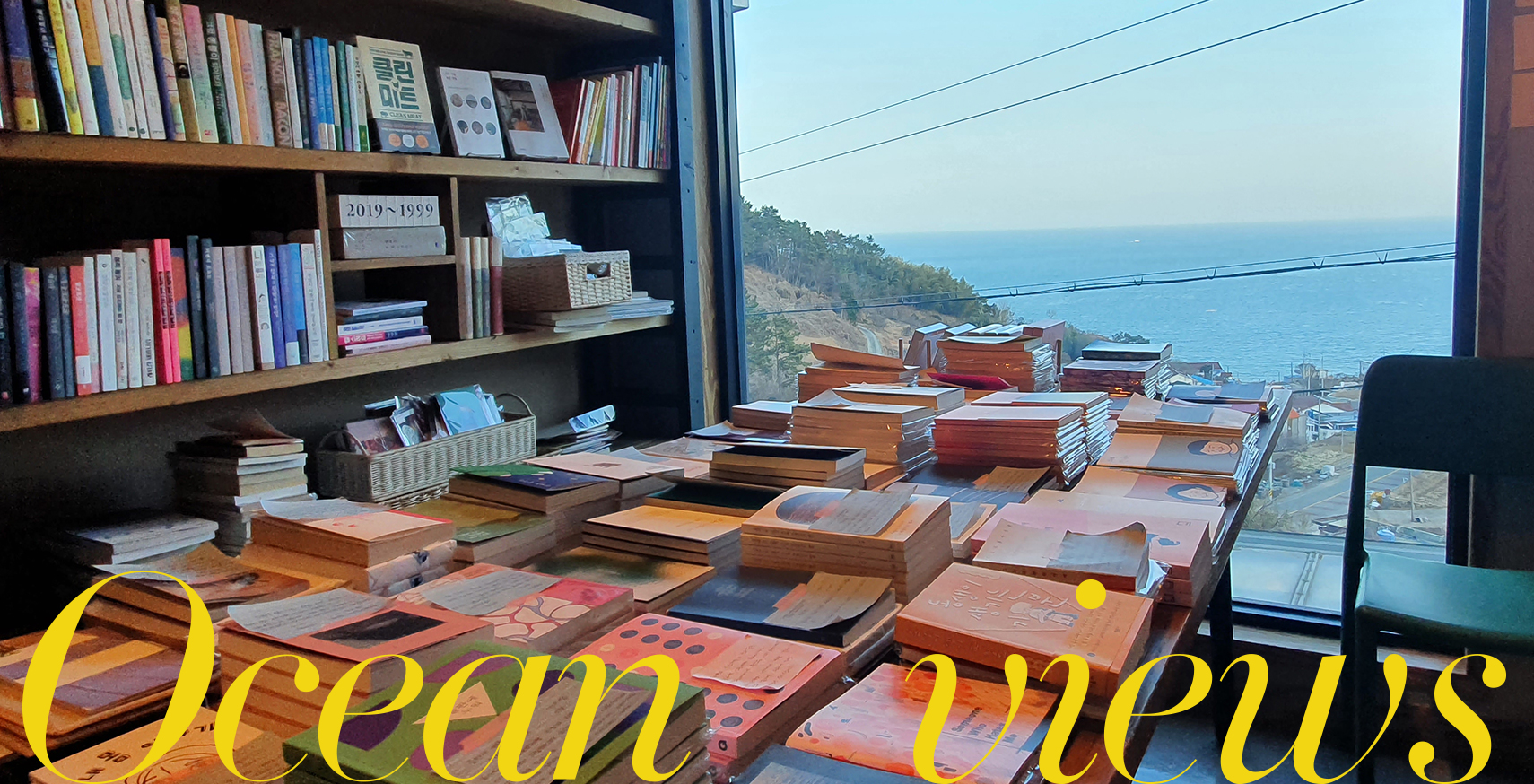
Or you find yourself in a neighborhood like Hapjeong, which has enough independent bookstores to attract readers from all over Seoul. My personal favorite, Thanksbooks, happens to be located in this neighborhood. I stumbled onto it while exploring Hongdae, panicked when it briefly closed, then rejoiced at its revamped reopening. While Hongdae is frenetic with clubs and lights, Hapjeong affords more of a specialty-coffee-and-indie-press atmosphere; Thanksbooks’ carefully curated, well-lit space for books smelling of the faint vanilla of paper now seems perfectly situated.
Curation is a primary reason you should visit more independent bookshops. The big bookstore chains have their place in the order of things, and while they’re very important, their mission is to be all things to all people. The smaller bookshops are more about the mood of its locality, the bent or tastes of the bookseller, the sense of adventure on the part of the reader-customer. Which is why we can have bookshops that sells only translations (the wonderful Translator’s Library, which also sells coffee) or books related to queer feminism (the intellectual oasis that is Ccol).
In contrast to franchised or chain bookstores that constantly offer me what I know I want or need, indie bookshops are more invested in giving me what I didn’t know I wanted. Did I know I wanted to read a biography of Jane Birkin, a book on his life in music by Joe Hisaishi, or a collection of aphorisms on poetics by Lee Seong-bok? I did not know this. But Thanksbooks did! I bought all of these books on their gentle suggestion and loved them, the way one loves books. If you’re a book person, you know what I mean by loving books. And Thanksbooks, Translator’s Library, Ccol — these are all places run by people who know what it means to love books.
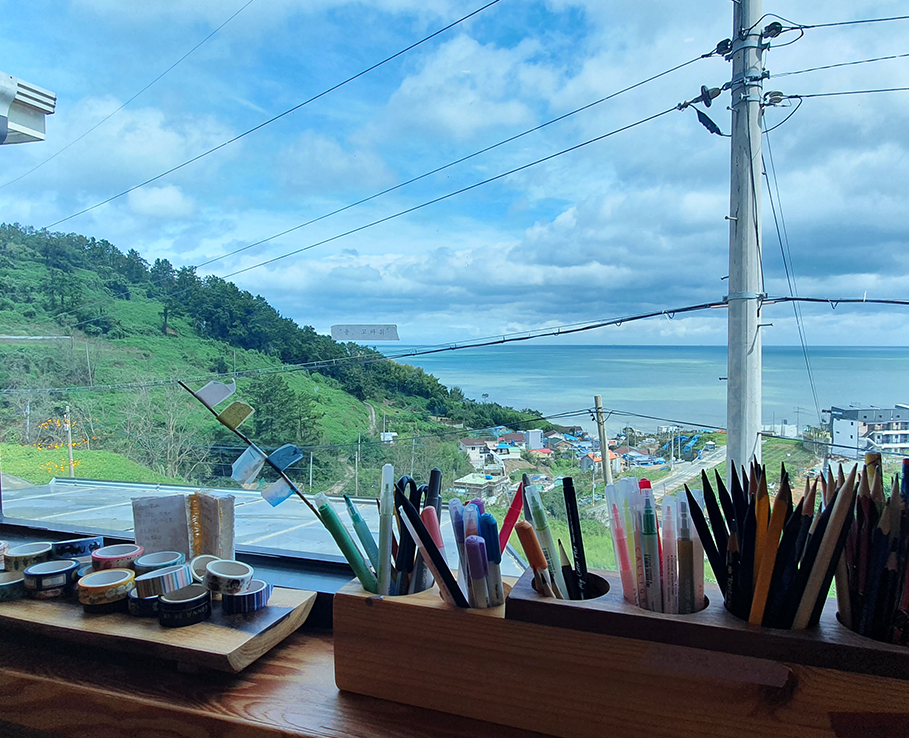
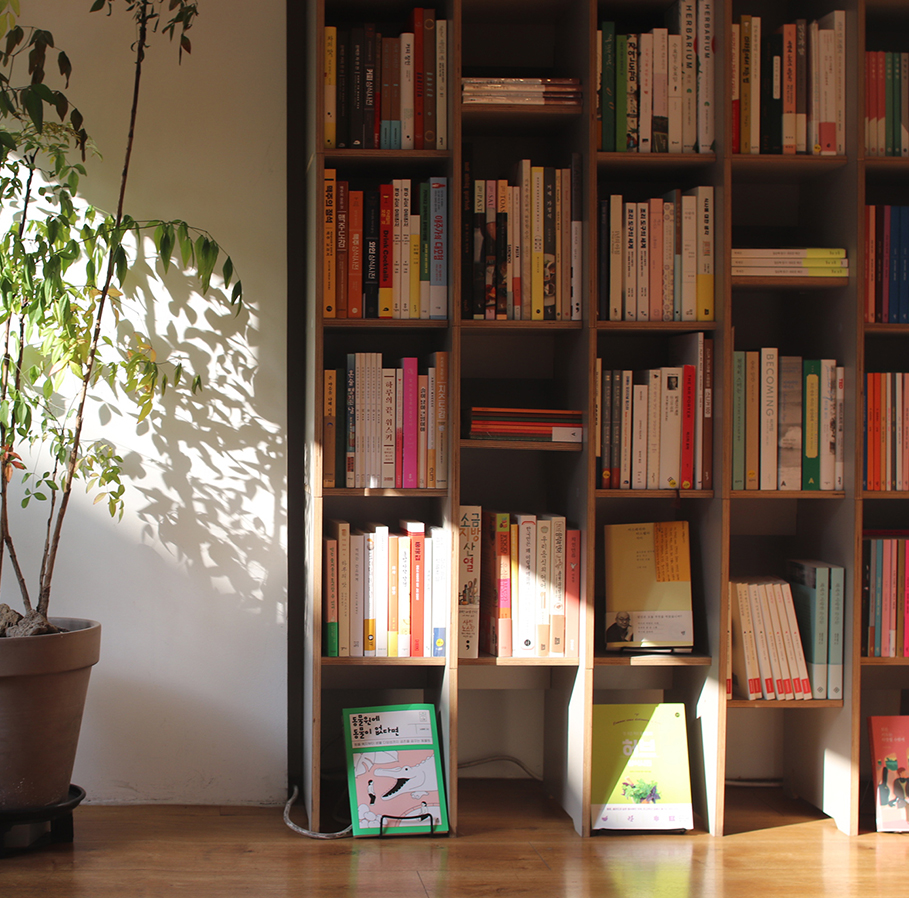 © THANKSBOOKS
© THANKSBOOKS
As a professional literary translator who carries over Korean books into English, I can’t help but be aware of how good Koreans have it when it comes to book culture. I shouldn’t be surprised; we did invent Hangeul, surely the most rational writing system in the world. Not to mention the fact that Korea invented moveable metal type almost a century before Gutenberg, achieving nearly 100% national literacy rate by the 1960s. Such advancements and Koreans’ long-held respect and reverence for texts and intellectual pursuits accumulated over eras to produce the rich literary ecosystem that our people take for granted today. In my world of Anglophone publishing, editors, book bloggers, and readers outside of Korea are often astonished at how physically beautiful Korean books are. No one uses such high-quality materials and technologies at this grand scale than the Korean publishing industry does. One of my British publishers recently even moved their printing operations from the U.K. to a printer in Paju, Gyeonggi-do Province near Seoul.
If physical books draw envious exclamations, the eclectic sights of Korean bookstores produce full-on body spasms. In these stores, each book has been carefully selected and lovingly looked after, so delectably displayed as if to tempt you into opening your wallet. I don’t think people give enough credit to the whole experience of how we find books, or to be more accurate, how books find us. We walk into a beautiful, carefully curated space. We admire the covers of the books on display, flick their flaps over to learn more about the author, turn to a random page to sample the language. We hold up the book to our ear and it says to us: Psst! Take me home, book person!
Book people like to think we’re impervious to moods, environmental cues, atmosphere, hype — let’s face it book person, you aren’t. You revel in the whole experience: from making your way to a bookstore and browsing in the vanilla-scented air upon arrival, to moments of discovery, then perhaps dropping by at a café to start reading. Here are some bookshops that cater to the whole experience of bookshopping, raising your favorite way to spend a Sunday afternoon to a new level.
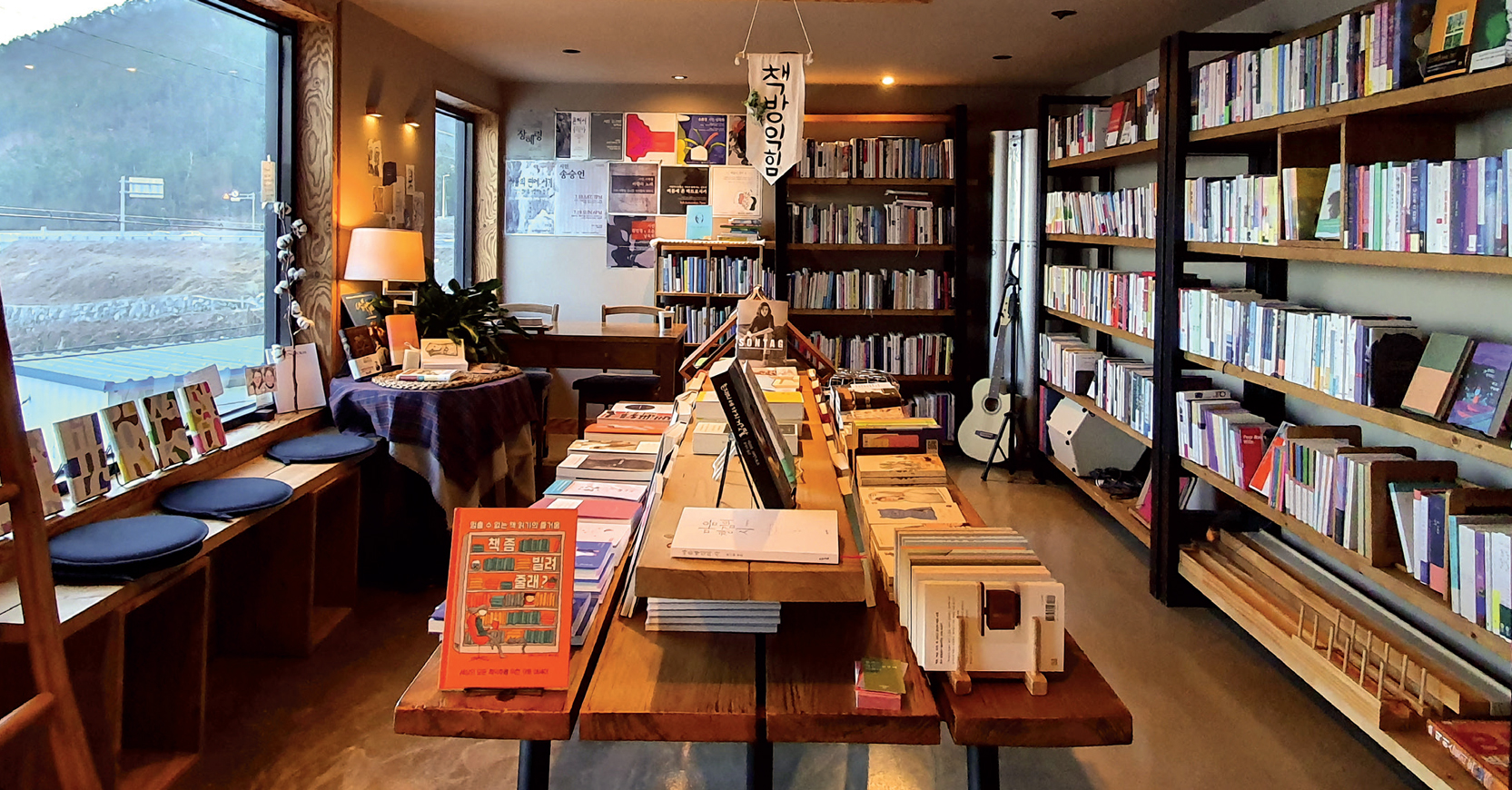
Salon de Chogo is “a café by day, bar by night and always a bookshop.” Boasting a gorgeously understated interior of gray brick and leather seats, Chogo (“first draft” in Korean) also runs a book club and hosts talks while offering comfortable reading spots. Try one of the literary cocktails fashioned after books and authors: you can read your new copy of Lee Soho’s “Catcalling” while sipping from the cocktail of the same title! And if Lee Soho happens to be giving a talk that evening, you’ve just stumbled onto the Perfect Seoul Moment.
If you’re more of an upscale-type person who frequents neighborhoods like Hannam-dong, be sure to drop by Still Books, a large, multi-story bookshop in Sounds Hannam. As part of the Sounds complex, you can find the trifecta of bookstore-café-art gallery that may at first encounter, make you feel like a modern-day explorer stumbling onto the ruins of Angkor Wat. A bookstore? Of this size? In this neighborhood? It was a reminder there will always be something new to discover in this city.
And lest not forget other cities! My family now divides its time between Songdo and Seoul, and during our first winter among the residential skyscrapers and carefully landscaped parks of this artificial island in southwest Incheon, I pined for easily accessible, well-kempt lit facilities stocked with books. Boy did I find one in Café Comma Songdo, the closest I’ll ever get to visiting the Beast’s Library in Beauty and the Beast (is it just me still stricken by those visually enticing, unattainable representations of a large room filled floor-to-ceiling with books?). Run by Munhakdongne, one of Korea’s most popular publishing houses, Café Comma Songdo takes up the vast multi-layer lobby of a big office building, lining walls and huge pillars with books as well as providing a variety of reading nooks. Not to mention the café and bakery. Bring your family bookworm and let them run feral all day.
Speaking of bookshops outside of Seoul, you can’t get further from Seoul on the mainland than Geoje Island. The poet Emily Jungmin Yoon recently gave a reading at a little bookshop and café there called Ikhim (Korean for “to become familiar with, to master”). It is the quintessential independent Korean bookshop: small, well-curated, well-lit, regularly hosted readings of poets like Emily. What makes this particular bookshop extra special, from the perspective of a Seoul slicker, is its view of the ocean. Imagine reading your freshly purchased book over a cup of coffee to look up at blue ocean waves plunged in afternoon sunlight. What more could you wish for?
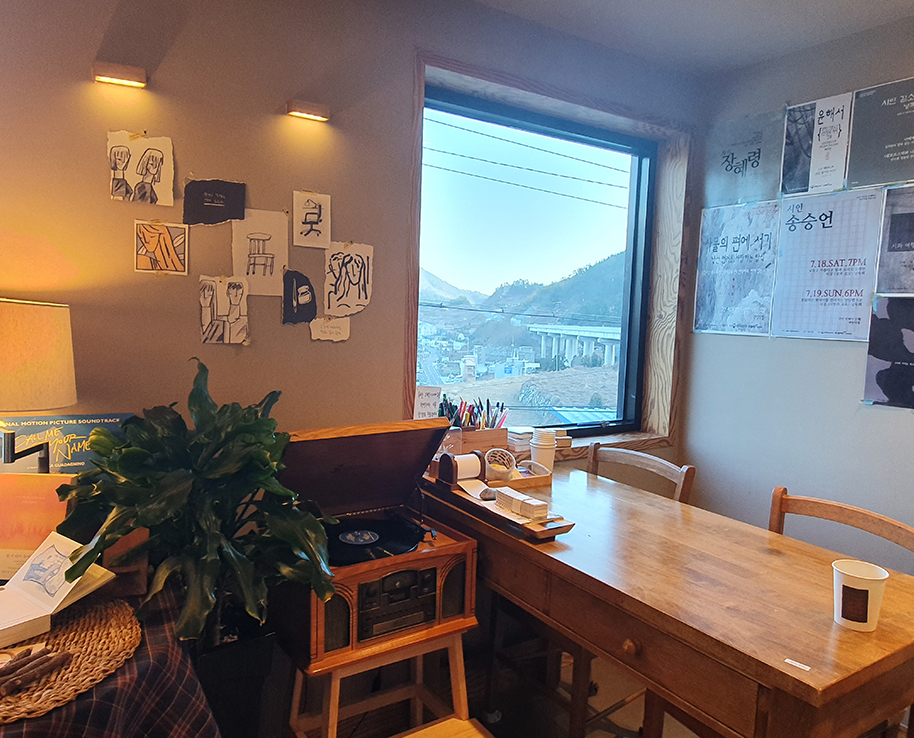
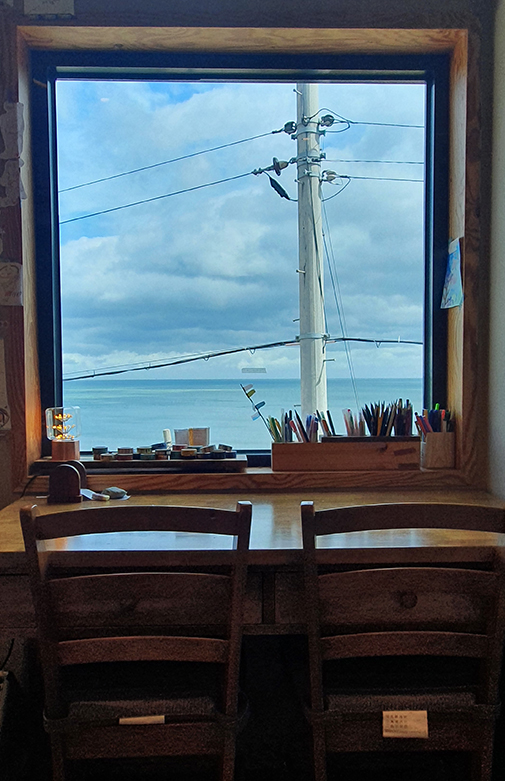
As a lifelong reader, I have always sought out bookstores wherever I traveled, regardless of whether I could read in the language or not. There are many that stick in my mind, like the Eslite 24 Hour Bookstore in Taipei, which closed a couple of years ago after thirty years of business, the Librarie Gallimard in Paris that I stumbled into for shelter from the rain, or that tiny Asia Books branch near Sukhumvit Soi 12 in Bangkok, which carries so few books one wonders how it still manages to make me part with so much of my money. Regardless, there’s no place quite as reliable as Korea for finding a good, local independent bookshop. In a small coastal village in Gangwon-do Province, I once walked into a tiny bookstore where a book club discussion was taking place, and the dead serious participants proceeded to ignore me as I quite embarrassingly squeezed past their chairs as I browsed (you’d think they’d ask me to leave!).
This significant number of independent bookshops surely has to do with the literary culture I’ve mentioned earlier, as well as with Korea’s public policy on fixed book prices, which limits discounting on books and prevents players with excessive capital from ruining the publishing ecosystem. The National Neighborhood Bookstore Network states that modifications to this policy in 2014 brought the number of independent bookstores in Korea from 101 in 2015 to 650 in 2020 (after years of dramatic decline from a whopping 5,368 in 1996). They also credit this policy with enabling the diverse array of independent book publishers in Korea up from 44,148 in 2013 to 60,184 in 2018 as well as the sheer variety of books that are published — 61,548 in 2013 to 81,890 in 2017. Despite these strides, we continue to hear overall readership continues to decline as books compete with content streaming and online games, and the pandemic that began last year certainly did not help, with many bookstores seeing at least a 40% decline in sales compared to the previous year.
I was overjoyed when a tiny independent bookshop opened in our old neighborhood in Guro district where I bought a book per every visit — only to have the pandemic hit almost right after. It broke my heart to find out on Instagram (where I follow many Korean bookstores) news of their closure. Many bookshops have weathered the pandemic as best they can; Wit and Cynical, a highly respected bookshop specializing in poetry, seems to do almost nightly Instagram Live broadcasts with poets and critics, keeping the flame of contemporary Korean poetry alive in the hearts of its customers. Bookshops are still very much open, and more readers seem to yearn for the comforts of reading more than ever.
Not long after announcing their closure, the Guro bookshop announced a reopening — inside a café! And so Bookroom Note was reborn on the first floor of Kkachi Café in Gwangmyeong, adjacent to Guro . Not only had our little neighborhood bookshop survived, it had reinvented itself to fit the bookstore-café trend, bringing a whole new level of reading experience for its customers, not to mention a whole lot of hope. For myself, of course, and for the next person who turns the corner and delights at their discovery of a small, beautiful, independent bookshop, in a city that never fails to surprise anew.